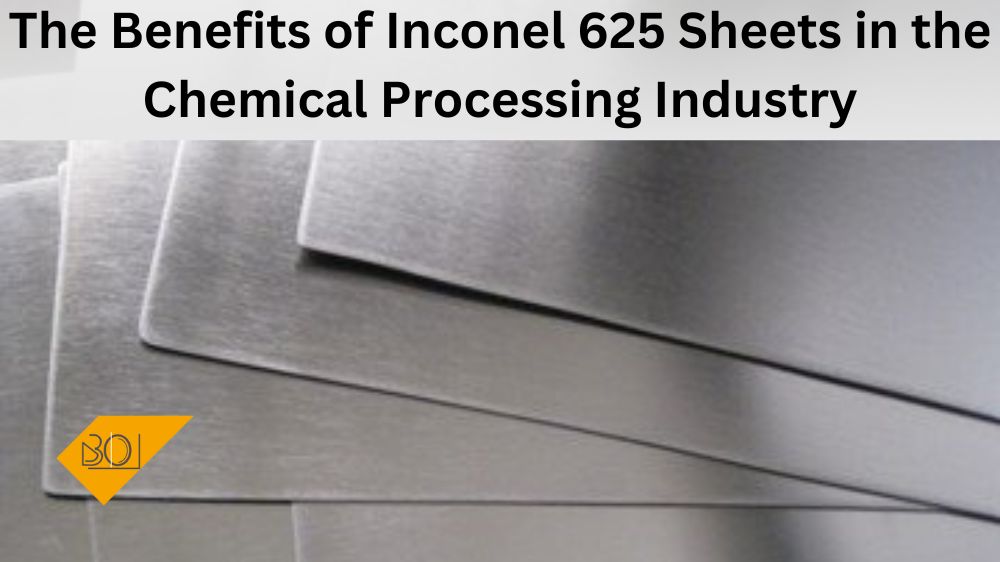Inconel 625 sheets are ideal for chemical processing due to their corrosion resistance and durability. The alloy resists various corrosive elements, including chloride-ion stress corrosion cracking. Additionally, Inconel 625 is designed to stand up against abrasions that can occur during chemical and mechanical processes as part of the product manufacturing process. Furthermore, Inconel 625 offers superior strength compared with other stainless steel alloys and exhibits high weldability for fabrication. Its versatility makes it an ideal choice for many industrial applications in the chemical processing industry.
What are Inconel 625 Sheets?
Inconel 625 sheets are nickel-chromium alloys with high strength and excellent corrosion resistance. They are used for various applications such as pressure vessels, exhaust systems, chemical processing equipment, cryogenic storage tanks and nuclear reactors. These sheets possess superior weldability properties and can easily work into almost any desired shape to suit the application’s needs. Their high-temperature capability makes them ideal for harsh environments where other conventional materials may not survive for a long time.
Advantage of Inconel 625 Sheets
Corrosion Resistance:
Inconel 625 is an alloy of nickel, chromium and molybdenum known for its outstanding corrosion resistance. The high levels of chromium provide excellent resistance to oxidation, reducing acids, chloride stress-corrosion cracking and crevice corrosion. In addition, the presence of niobium in this alloy helps to increase the strength at elevated temperatures while maintaining good flexibility down to temperatures as low as cryogenic temperatures. Furthermore, its unique composition also allows it to resist chloride pitting corrosion, commonly occurring with other materials when exposed to saltwater environments or acidic solutions over time.
High-Temperature Resistance:
Inconel 625 sheets provide superior corrosion and oxidation resistance and high-temperature strength up to 2000°F. Furthermore, these sheets resist pitting and crevice corrosion in oxidizing and reducing environments, making them well-suited for use in extreme conditions. In addition, the alloy’s low coefficient of thermal expansion aids its ability to retain high-temperature strength even under fluctuating temperatures. The combination of properties makes Inconel 625 an ideal choice for applications involving corrosive industrial gases like nitric acid or sulfuric acid and heat exchangers operating at elevated temperatures.
Fatigue Resistance:
Inconel 625 Sheets are well known for their excellent fatigue resistance due to their nickel-chromium-molybdenum alloy composition. They offer high strength, corrosion and oxidation resistance, weldability, formability and fabricability. This makes them an ideal choice for applications where fatigue resistance is paramount. Their superior tensile and yield strengths also increase the sheets’ longevity, increasing their ability to resist crack propagation in highly cyclic load environments. In addition, they show good ductility and toughness at cryogenic temperatures as low as -200°C. Therefore, Inconel 625 Sheets can be used in various wear-resistant applications, such as marine exhaust systems and components exposed to extremely corrosive conditions with extreme temperature cycles.
Machinability:
Inconel 625 is relatively easy to work with, and it can be machined into components of various shapes and sizes. This makes it suitable for manufacturing complex components, which can be custom designed to suit the specific needs of the chemical processing industry.
Cost-Effective:
Inconel 625 may seem expensive compared to other materials, but its longevity, durability, resistance to corrosion and high temperatures make it highly cost-effective in the long run. Components made from Inconel 625 are less likely to require replacement or repair, reducing downtime and overall maintenance costs.
Conclusion:
Inconel 625 is an excellent material for use in the chemical processing industry due to its high corrosion resistance, high-temperature resistance, fatigue resistance, machinability, and cost-effectiveness. The material is ideal for various applications, including heat exchangers, reaction vessels, thermocouple protection tubes, furnace components, and pumps. By using Inconel 625 sheets, the chemical processing industry can enhance its efficiency, productivity, and safety, all while reducing maintenance costs and downtime.

